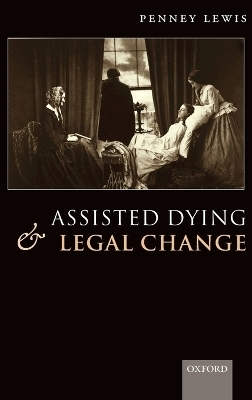
Assisted Dying and Legal Change
Seiten
2007
Oxford University Press (Verlag)
978-0-19-921287-3 (ISBN)
Oxford University Press (Verlag)
978-0-19-921287-3 (ISBN)
The question of whether euthanasia and assisted suicide should be legalized is often treated as a universal, ethical question, transcending national boundaries and diverse legal systems. This book examines the impact of the choice of diverse legal routes towards legalization on the subsequent assisted dying regimes in operation.
The question of whether euthanasia and assisted suicide should be legalized is often treated, by judges and commentators alike, as a universal, ethical question, transcending national boundaries and diverse legal systems. By thinking of the issue in this way, the important context in which individual jurisdictions make decisions about assisted dying and the significance of the legal methods chosen to carry out those decisions is often lost.
This book examines the impact of the choice of diverse legal routes towards legalization on the subsequent assisted dying regimes in operation. This examination suggests that greater caution is needed before relying on the experience of one jurisdiction when discussing proposals for regulation of assisted dying in others. The book seeks to demonstrate the need to explore the legal environment in which assisted dying is performed or proposed in order to evaluate the relevance of a particular legal experience to other jurisdictions.
The book begins with an examination of the unsuccessful attempts to use constitutionally entrenched human rights claims to challenge criminal prohibitions on assisted suicide which reached the highest courts in the United States, Canada and Europe. Their failure makes legalization through a rights-based claim unlikely in any major common law or European jurisdiction. Alternative routes towards legalization are then discussed, including the defence of necessity, by which euthanasia was effectively legalized in the Netherlands and an approach based on compassion which has been proposed in France, as well as the legislative approaches which have been taken in Oregon, Belgium and the Northern Territory of Australia. All of these approaches are compared in detail, with particular attention paid to the effectiveness and transferability of the ubiquitous slippery slope arguments
The question of whether euthanasia and assisted suicide should be legalized is often treated, by judges and commentators alike, as a universal, ethical question, transcending national boundaries and diverse legal systems. By thinking of the issue in this way, the important context in which individual jurisdictions make decisions about assisted dying and the significance of the legal methods chosen to carry out those decisions is often lost.
This book examines the impact of the choice of diverse legal routes towards legalization on the subsequent assisted dying regimes in operation. This examination suggests that greater caution is needed before relying on the experience of one jurisdiction when discussing proposals for regulation of assisted dying in others. The book seeks to demonstrate the need to explore the legal environment in which assisted dying is performed or proposed in order to evaluate the relevance of a particular legal experience to other jurisdictions.
The book begins with an examination of the unsuccessful attempts to use constitutionally entrenched human rights claims to challenge criminal prohibitions on assisted suicide which reached the highest courts in the United States, Canada and Europe. Their failure makes legalization through a rights-based claim unlikely in any major common law or European jurisdiction. Alternative routes towards legalization are then discussed, including the defence of necessity, by which euthanasia was effectively legalized in the Netherlands and an approach based on compassion which has been proposed in France, as well as the legislative approaches which have been taken in Oregon, Belgium and the Northern Territory of Australia. All of these approaches are compared in detail, with particular attention paid to the effectiveness and transferability of the ubiquitous slippery slope arguments
Penney Lewis is Reader in Law at the Centre of Medical Law and Ethics and the School Law, King's College London where she teaches medical law and criminal evidence. From September 2007 she will be Professor of Law.
1. Introduction ; 2. Rights to Assisted Dying ; 3. The Effects of Rights ; 4. Duties and Necessity ; 5. Compassion ; 6. Comparing the Mechanisms of Legal Change ; 7. The Slippery Slope
| Erscheint lt. Verlag | 8.3.2007 |
|---|---|
| Verlagsort | Oxford |
| Sprache | englisch |
| Maße | 162 x 241 mm |
| Gewicht | 530 g |
| Themenwelt | Medizin / Pharmazie ► Pflege ► Palliativpflege / Sterbebegleitung |
| Recht / Steuern ► EU / Internationales Recht | |
| Recht / Steuern ► Privatrecht / Bürgerliches Recht ► Medizinrecht | |
| Sozialwissenschaften ► Politik / Verwaltung | |
| Sozialwissenschaften ► Soziologie | |
| ISBN-10 | 0-19-921287-2 / 0199212872 |
| ISBN-13 | 978-0-19-921287-3 / 9780199212873 |
| Zustand | Neuware |
| Haben Sie eine Frage zum Produkt? |
Mehr entdecken
aus dem Bereich
aus dem Bereich
Praxishandbuch zur Palliative-Care-Kommunikation
Buch | Softcover (2023)
Hogrefe AG (Verlag)
30,00 €
Gespräche mit Menschen mit geistiger Behinderung über Sterben, Tod …
Buch | Softcover (2018)
Springer (Verlag)
39,99 €


